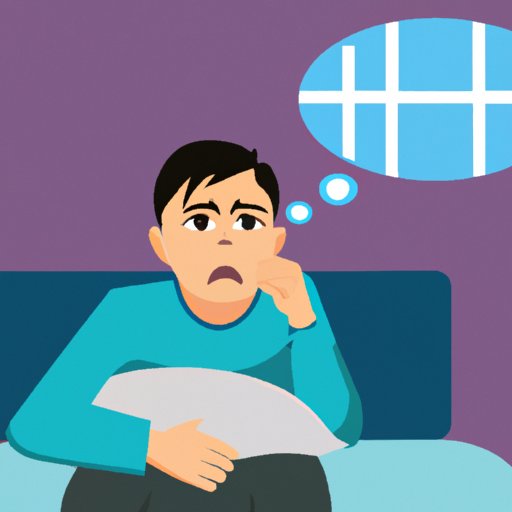
Introduction
Anxiety is a common mental health disorder affecting millions of people worldwide. While anxiety can manifest in various ways, one of the most common symptoms is fatigue. Feeling tired or exhausted can make it challenging to perform daily duties and affect overall quality of life.
In this article, we will explore the link between anxiety and fatigue, discussing how anxiety affects our energy levels and reviewing the science behind it. We will also provide tips and tricks to help manage anxiety-related fatigue.
The Connection Between Anxiety and Fatigue: Exploring the Link
Anxiety can take a toll on both the mind and the body. While the most well-known symptoms of anxiety relate to emotional stress, anxiety can manifest in the body physically as well, leading to exhaustion and fatigue.
In many ways, anxiety is designed to make you feel tired. Our body’s natural stress response, often activated by anxiety, involves the production of various stress hormones like cortisol and adrenaline. This response is supposed to prepare your body for immediate action, such as fighting or fleeing. However, constant activation of this response system can lead to exhaustion.
Additionally, anxiety can cause a person’s mind to race, leading to sleep disturbances, which can also lead to exhaustion.
Why You’re Feeling Exhausted: How Anxiety Affects Your Energy Levels
Anxiety affects our energy levels through numerous complex mechanisms, triggering the body’s stress response and leading to the production of cortisol, adrenaline, and other stress hormones. These stress hormones allow the body to be prepared for action during emergencies and can initially increase energy levels and attention. However, chronic activation of the stress system can lead to exhaustion.
A study published in the Journal of Clinical Endocrinology and Metabolism found that chronic stress led to reduced cortisol levels in the blood, indicating chronic stress exhaustion. This may explain why people with chronic anxiety often feel tired and lethargic.
The Science Behind Anxiety-Induced Fatigue: A Breakdown
Understanding the brain’s chemistry helps us understand how anxiety can cause fatigue. Anxiety can affect the brain’s neurotransmitter production, which are chemicals that help regulate our mood and behavior. These neurotransmitters, such as serotonin and dopamine, play a crucial role in keeping us feeling alert and energized.
Anxiety can also cause inflammation in the body, which is a significant energy drain. Inflammatory chemicals affect the brain and other parts of the body, leading to feelings of lethargy and fatigue.
Tired of Being Tired? How to Cope with Exhaustion Caused by Anxiety
If you’re experiencing anxiety-related fatigue, there are things you can do to help manage your symptoms. Here are some tips:
- Make sure to get enough sleep by establishing healthy sleep habits, such as avoiding electronic devices in the evening hours, using a comfortable bed, and creating a relaxing bedtime routine.
- Exercise regularly to help release endorphins that can improve energy levels.
- Engage in stress-reducing activities such as meditation and deep-breathing exercises.
- Eat a healthy, well-balanced diet rich in nutrient-dense foods to support your body’s needs.
- Consider seeking out support from a therapist or mental health professional.
It’s important to note that if your anxiety is severely impacting your daily life, it’s essential to seek professional help. A healthcare provider can provide you with more tools and resources to help manage your anxiety-related fatigue.
Anxiety and Insomnia: Understanding How Lack of Sleep Makes You Tired
Anxiety can lead to insomnia, which can also lead to exhaustion. Sleep disturbances are common in people with anxiety disorders and can exacerbate existing symptoms. Sleep is essential for our bodies to repair and restore themselves, and without it, our immune systems can weaken, and our cognitive performance can decline.
If you’re experiencing anxiety-related insomnia, practicing good sleep hygiene can help. This includes strategies like keeping a regular sleep schedule, avoiding caffeine and alcohol in the evening, and creating a relaxing sleep environment.
10 Ways to Boost Your Energy When Anxiety is Draining You
Here are some helpful tips to increase your energy levels when feeling anxious and tired:
- Take a brisk walk outside and get some fresh air
- Distract yourself with an entertaining activity (e.g., binge-watch your favorite show, read a book, etc.)
- Drink a cup of coffee or tea for a quick boost of energy
- Take a quick nap or rest quietly in a calm, dark place
- Try aromatherapy with invigorating scents like peppermint or lemon
- Eat a healthy snack such as berries or nuts to boost your metabolism
- Drink plenty of water to help keep your energy levels up and to stay hydrated
- Stretch or perform some light exercise like yoga
- Connect with friends or family members to help lift your mood and energy levels
- Take time for self-care. Read a book, do a relaxing activity, or have a warm bath or massage.
Conclusion
Anxiety and fatigue can go hand in hand, but there are things you can do to help manage your symptoms. Understanding the connection between anxiety and fatigue is an important step towards identifying practical solutions that work for you. By making adjustments to your lifestyle and seeking professional help, you can help alleviate anxiety-related fatigue and start living a happier, healthier life.




